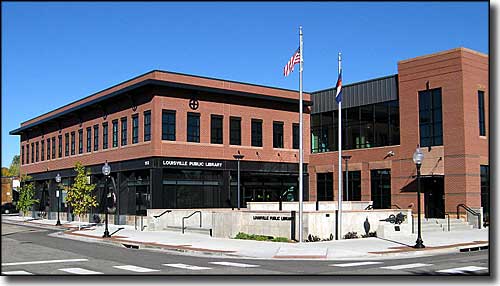
Louisville, Colorado

Louisville Public Library, built in 2006
Louisville is one of those cities in Boulder County that started out as housing for miners, then transitioned into a suburban residential community after the mines closed in the 1950's. Louisville is in the heart of what once was known as the Northern Colorado Coalfield, an area that produced a lot of low-grade, sub-bituminous coal. Louisville was named for Louis Nawatny, a local landowner at the time who platted the town on his own property and then named the settlement after himself.
Over the years, some 30 coal mines operated off-and-on within the city limts of Louisville. The 1920's saw a lot of labor unrest and violence in the area. Louisville was not a "company town" and was often the target for bullets fired by various of the strike-breaking organizations brought in by the mine owners during times of labor unrest. Because of that situation, many of the original homes in Louisville had dirt basements for the residents to use for hiding from the random machine gun bullets fired into the town from various of the towers and tipples on some of the mine sites around Louisville (apparently, the method most often employed to "protect" mine property was to randomly fire a few rounds into the town to remind the townspeople as to who was in charge).
Eventually, that high sulphur, sub-bituminous, self-igniting coal became too uneconomical to mine, the coal mines all shut down and Louisville slowly evolved into the city that is now highly recognized for its excellent quality of life (CNN/Money and Money magazine rated Louisville #5 on their list of top 100 best places to live in the U.S. in July 2005; Best Places to Raise Your Family ranked Louisville #1 for best place to raise a family in May 2006; and CNN/Money and Money magazine rated Louisville #3 on their list of top 100 best places to live in the U.S. in August 2007).
Latitude: 39.976°N
Longitude: 105.1441°W
Incorporated: June 3, 1882
Elevation: 5,335'
Education:
High School or Higher: 96.3%
Bachelor's Degree or Higher: 59.9%
Graduate or Professional Degree: 22.3%
2011 Cost of Living Index for Louisville: 110.7
Median Resident Age: 36.0 Years
Estimated Median Household Income: $79,424
Estimated Median Home Value: $340,253
Major Industries:
Professional Services, Educational Services, Computers & Electronic Products, Health Care, Construction, Lodging & Food Services, Finance & Insurance Services, Government, Retail Services, Waste Management Services
Unemployed: 9.0%
Population Demographics: 2010
| Total Population | 18,376 |
| Males | 8,996 |
| Females | 9,380 |
| Population by Age | |
| Under 18 | 4,476 |
| 18 & over | 13,900 |
| 20-24 | 806 |
| 25-34 | 1,952 |
| 35-49 | 4,452 |
| 50-64 | 4,509 |
| 65 & over | 1,828 |
| Population by Ethnicity | |
| Hispanic or Latino | 1,318 |
| Non Hispanic or Latino | 17,058 |
| Population by Race | |
| White | 16,682 |
| African-American | 112 |
| Asian | 729 |
| Native American | 79 |
| Hawaiian or Pacific Islander | 7 |
| Other | 320 |
| Two or more | 447 |
Lyons - Nederland - Superior - Ward - Boulder County
Eldorado Canyon State Park - Eldora Mountain Ski Resort - Peak to Peak Scenic Byway
Indian Peaks Wilderness - Arapaho-Roosevelt National Forest
State Trust Lands and Wildlife Areas
National Park Service Sites - BLM Sites - National Wilderness Areas - Unique Natural Features
Outdoor Sports & Recreation - Ski & Snowboard Areas - Photo Galleries - Colorado Mountains
